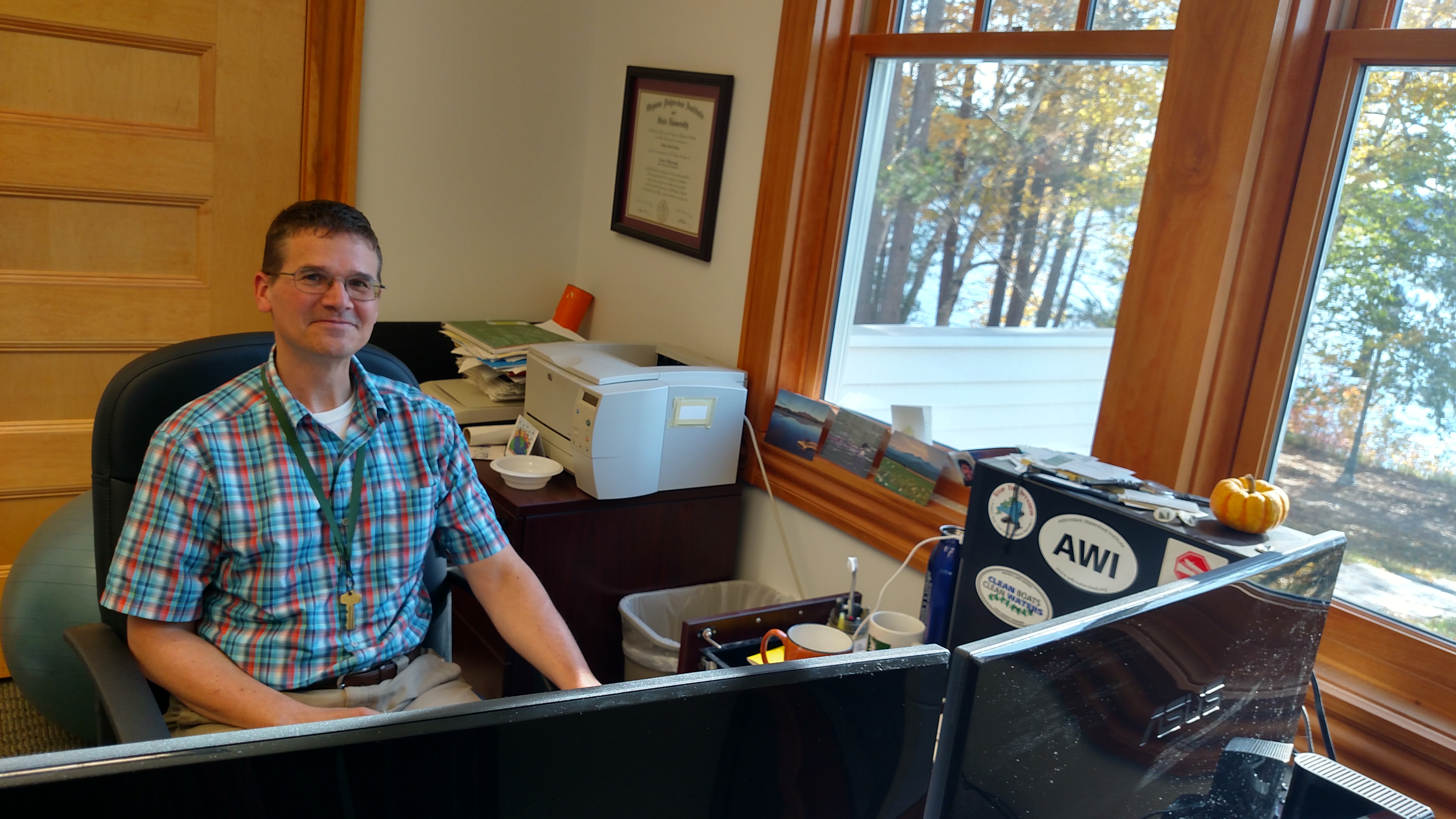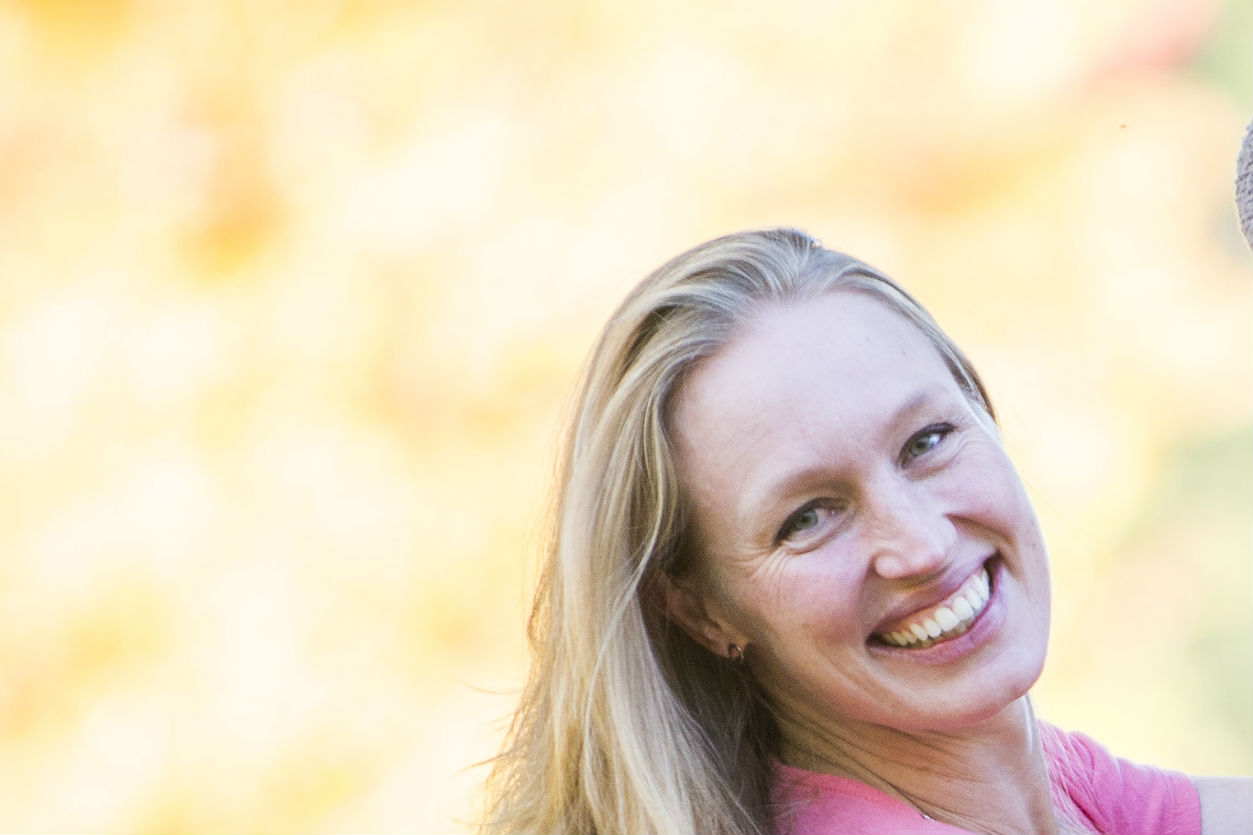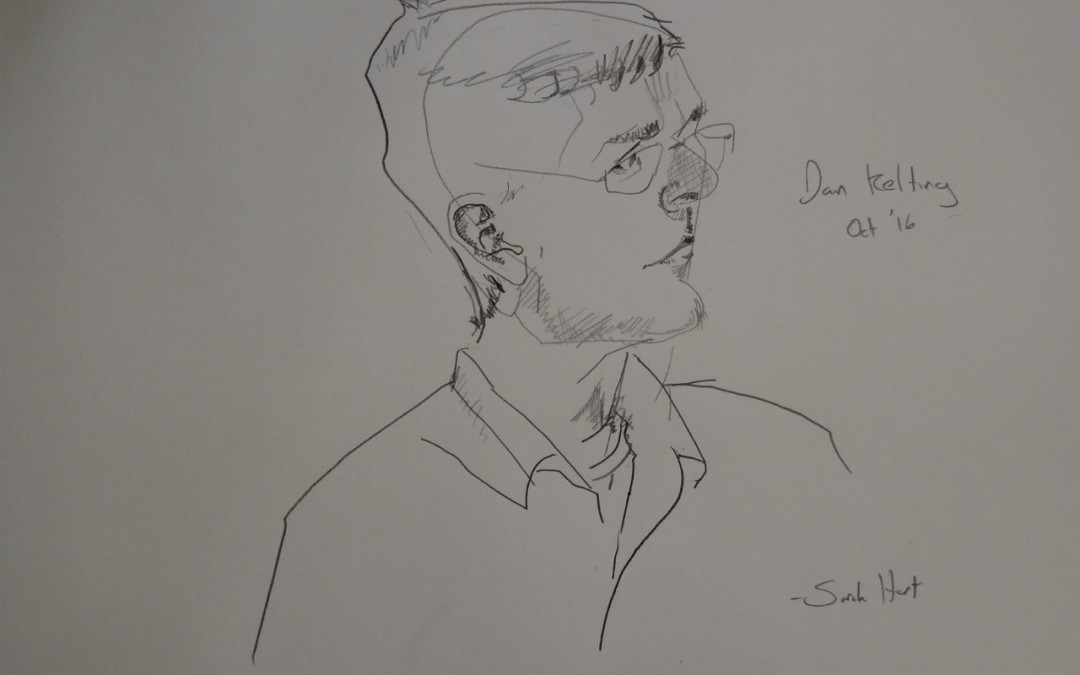by Sarah J Hart
“Thank you so much for meeting with me Dr. Kelting” I say. He waves his hand. “It’s Dan. Please call me Dan.”
We settle into the conference room in the beautiful Paolozzi Center – the airy, elegant building which houses the Adirondack Watershed Institute (and a gallery-worth of gorgeous paintings by Lee Ann Sporn and Sage McKenzie). Calling him ‘doctor’ was my fumbling attempt to convey respect for the man who had recently left me, and the rest of the audience, in awed silence with his open-hearted – and good humored – Smitty Talk presentation about living with a disability. Dr. Dan Kelting, Executive Director of the Adirondack Watershed Institute (AWI) and professor of soil sciences in the Forestry Program, is that rare individual who is unanimously admired and respected. I nearly said something to that effect, as he urged me to dispense with the formalities and just call him Dan, but instead I mumbled something along the lines that surely being PhD-ed was something to be proud of…
“Well actually it’s my associate’s degree that I am most proud of,” he said.
Dan comes from Malone, New York. Growing up he spent a lot of time in the Adirondacks hiking, fishing, exploring. “I have always loved being outdoors,” he said. There was a forest ranger – Peter Fish – that he had massive regard for when he was a boy and he decided early on that when he grew up, he too wanted to be a forest ranger.
In high school Dan was good at math and drawing and a counselor advised him to consider architecture. So Dan started college in an architecture program – and he did terribly. “I think one semester I actually got a 0.4” It just wasn’t for him. But he had a girlfriend at the time who was in forestry and she’s the one who suggested that he switch programs. Dan dropped out of architecture and enrolled in the SUNY-ESF Ranger School, near Wanakena, New York. “That turned me around,” Dan said. It was a transformational change. Dan is most proud of the A.A.S. degree he earned from Ranger School because it represents finding the path that was right for him.
After graduating, Dan worked as field technician for a paper company in Maine. He worked there long enough to know that he wanted to go back to school for the degree that would allow him a more decision-making role in his field.
The years that Dan spent getting his bachelor’s degree were also years of great exploration and adventure. He and a friend drove up to Alaska (one of those ‘epic journeys’ when many memories are made including, in their case, such a thorough breaking down of their van that they had to push it across the border) where he worked in commercial fisheries for a bit. And then he made his way to Colorado, where he skied and biked and hiked and worked by night in a grocery store, all the while taking classes and gradually finishing his degree.
The friends Dan fell in with were academically-inclined. Eventually Dan packed up his adventuring gear, came back East, and launched into a graduate program in Virginia. “I loved it,” he said. “It was great because I was ready for it.” Working and adventuring, through most of his 20s not only helped Dan hone in on what he wanted to study, but it also made the return to the structure and discipline of school enjoyable, like another adventure.
While in his PhD program Dan met the woman who eventually became his wife and directly after they finished their studies they plunged into intense and rigorous jobs. Dan became an Assistant Professor at North Carolina State University – a research position. This was a prestigious role – well paid, and in a department that was well-established and well-funded. It was also very demanding. Dan was out of the house by 6 am and usually not home until 7 pm. He traveled often, sometimes to Chile and Columbia. His wife’s work was similarly demanding. When their son was born they hired a nanny and went right back to work – though suddenly the downside of this lifestyle, which required them to be absentee parents, had revealed itself.
One day Dan was helping a student – he worked at the time only with graduate students – navigate some online job searches when up popped an opening at Paul Smith’s College, in the just-getting-established Adirondack Watershed Institute. The opportunity flashed, Dan found himself hustling his student on to other employment options; the seed was planted.
Leaving the track he was on at NCSU and moving back to the Adirondacks was not an easy change to make. Dan faced a lot of pressure to stay where he was. Many of those he worked with, and those who felt they’d been mentoring him along a particular path, insisted that he was crazy to leave such a secure position for something that was, at the time, little more than an idea. But the pull towards home, and the hopes for a life that would let them be more present as parents, was strong. In 2003, Dan and his wife sold the house they’d built in North Carolina, and moved to Paul Smith’s.
Dan has been at the college now for 13 years. His daughter was born here in 2004. He teaches, and he’s worked with his colleagues to build AWI into the well-established institution that it is now, working on water quality and watershed research and monitoring in the Adirondacks.
Alongside all this, there’s another story unfolding in Dan’s life. While still a graduate student, in the ‘90s, Dan had gone to see a doctor about a problem he was having with his eyes. The doctor’s shocking diagnosis was: ‘probable cause: Multiple Sclerosis.’ Without health insurance, and not wanting to give that ‘probable’ a chance to evolve to something more frightening, Dan said thanks, and then put it out of his mind. His strange eye symptoms went away, and for some years everything was fine.
Then in 2005, Dan’s leg started to bother him, and it did not go away. This time the diagnosis was definitive. In 2006 Dan had to accept that he had progressive MS, an autoimmune disease characterized by damage to the central nervous system. MS interferes with the communication between the brain and the rest of the body and as of now, there is no known cure.
In the past 10 years Dan has undergone chemotherapy, strong steroids, and experimental therapy in the effort to stem the progression of his MS. He has lost the use of his right arm and hand (“Thankfully I’m left-handed,” he said with a smile), and walks with a limp.
Dan spoke about all this with calm, and even humor, recently in front of a group of his colleagues and students in the Adirondack Room. He said it was his first time talking openly about it in front of a crowd. This is way out of my comfort zone, he said, but it’s important to do. One of his main messages was that he felt lucky to be by nature an optimistic person. The MS is terrible – it’s frustrating and scary and infuriating. Dan said it was particularly hard to not be able hike and do things outdoors, as he used to. And yet Dan finds something positive gleaned from this experience. “It’s given me real empathy,” he explained. Compassion for others who suffers comes from, for Dan, a very real source of understanding.
Last year Dan Kelting stepped into the role of Interim Dean of NRME (Natural Resource Management and Ecology – a clustering of programs that has since been dissolved into the current system). Although he missed teaching, he enjoyed the deep immersion the position allowed him into the administration of the school.
Dan is drawn to work that solves problems. I like being helpful, he explained. “At AWI, that’s what we do – practical work, looking for solutions to issues.” In the role of dean he was more intimately involved in problem solving for the school than he had ever been previously.
What will the future bring? Not sure…Dan said. He loves teaching. He loves research. He believes in Paul Smith’s and knows we are a good school. “And something important I learned last year – I learned not to make assumptions.”

Sarah Hart is the Managing Editor of the Apollos. Check out her bio here!

